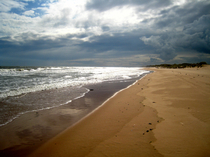 We’ve already discussed the possibility of insurance rate hikes, but more recent news reports make it seem much more like a certainty. According to industry experts, homeowners could be receiving higher home insurance premiums with less coverage.
We’ve already discussed the possibility of insurance rate hikes, but more recent news reports make it seem much more like a certainty. According to industry experts, homeowners could be receiving higher home insurance premiums with less coverage.
It is believed that more than 4 million Florida homeowners are about to get hit by rate hikes and shrinking coverage. Even though we have not been hit by a hurricane in five years, the State’s insurance regulators have already approved $718 million in rate increases.
It is interesting to note that profits for U.S. property and casualty insurers rose 63 percent to $27 billion for the first nine months of 2010 from $16 billion for the same period in 2009. At that same time, insurers’ claims-paying reserves grew by 7 percent to $545 billion as of Sept. 30 from $511 billion at the end of 2009. Yet despite this news, Florida’s insurance companies are seeking rate increases, and Florida’s policy makers are considering passing laws that will make it harder for homeowners to bring claims against their insurance companies.
A spokesperson for the Insurance Information Institute (III) states several factors have led to the come rate hikes. These include an increase in reports and payouts for sinkhole repairs. Also, changes in hurricane mitigation discounts have contributed to the coming hikes. According to the III, Florida is exposed to more catastrophic loss than any other state.
“Our population has grown and the building boom of the past few years put more people and more property in areas of the state that are most vulnerable to hurricane damage and storm surge.” The spokesperson also stated that a single major catastrophe in Florida could lead to losses as high as $10 billion. As a result, insurance companies basically need the hikes in order to account for this possibility.
In respect to sinkholes, Florida law obliges insurers to pay for full replacement cost upfront for sinkholes. Part of the reason for the surge in sinkhole claims is due in large part to the recent explosion in real estate development throughout Florida, and especially in South Florida. Over development has left the ground susceptible to sinkholes. Plus, while sinkholes occur in other U.S. states, Florida is more prone to sinkhole related problems because of underground limestone that dissolves under certain conditions, especially in areas that have been over developed, according to many leading geologists.
According to the Florida Office of Insurance Regulation, the state-backed Citizens Property Insurance won approval for rate hikes. Citizens justified the rate hikes by stating it needed to become more actuarially sound.
—–
EXTENDED BODY:
Consider Your Options. Contact Us Today.
Before opening our law firm in 2006, our attorneys worked for some of the state’s, and nation’s, largest law firms, and worked representing the insurance companies for years. Our attorneys are now uniquely positioned to use that experience to assist individuals and businesses alike throughout Florida with their insurance claims. As a result, our attorneys are well versed in the impact insurance has on businesses, condominiums, and individuals alike. Our insurance litigation practice group is prepared to tackle your insurance claim.
Given our extensive experience litigating for, and against, insurance companies, our insurance litigation practice group is prepared to provide aggressive, efficient and effective representation on a broad spectrum of insurance claims in Florida for local, national, and international clients. We are prepared to advocate insurance claims at the pre-suit stage, trial, appellate and arbitration levels.
If you are facing a dispute over an insurance claim in Florida, contact Alvarez & Barbara, LLP for a free and confidential consultation to discuss your rights.
Call us today toll free at 1-866-518-2913 or at 305-263-7700.